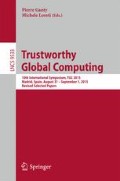Abstract
The security validation of practical computer systems calls for the ability to specify and verify information flow policies that are dependent on data content. Such policies play an important role in concurrent, communicating systems: consider a scenario where messages are sent to different processes according to their tagging. We devise a security type system that enforces content-dependent information flow policies in the presence of communication and concurrency. The type system soundly guarantees a compositional noninterference property. All theoretical results have been formally proved in the Coq proof assistant [9].
Access this chapter
Tax calculation will be finalised at checkout
Purchases are for personal use only
Notes
- 1.
The proof script is accessible at http://lbtweb.pbworks.com/w/file/fetch/97133580/dif_com_coq.zip.
- 2.
This pattern is reminiscent of the “Weak bisimulation up to H" by Focardi and Rossi [14].
References
Amtoft, T., Dodds, J., Zhang, Z., Appel, A., Beringer, L., Hatcliff, J., Ou, X., Cousino, A.: A certificate infrastructure for machine-checked proofs of conditional information flow. In: Degano, P., Guttman, J.D. (eds.) Principles of Security and Trust. LNCS, vol. 7215, pp. 369–389. Springer, Heidelberg (2012)
Apt, K.R.: Ten years of Hoare’s logic: A survey - part 1. ACM Trans. Program. Lang. Syst. 3(4), 431–483 (1981)
Austin, T.H., Flanagan, C.: Efficient purely-dynamic information flow analysis. In: PLAS 2009, pp. 113–124 (2009)
Besson, F., Bielova, N., Jensen, T.: Hybrid information flow monitoring against web tracking. In: CSF 2013 (2013)
Boudol, G., Castellani, I.: Noninterference for concurrent programs and thread systems. Theoret. Comput. Sci. 281(1), 109–130 (2002)
Broberg, N., Sands, D.: Paralocks: role-based informationflow control and beyond. In: POPL 2010, pp. 431–444 (2010)
Clarkson, M.R., Chong, S., Myers, A.C.: Civitas: Toward a secure voting system. In: S&P 2008, pp. 354–368 (2008)
Cohen, E.S.: Information transmission in computational systems. In: SOSP 1977 (1977)
The Coq Proof Assistant. http://coq.inria.fr
Dam, M.: Decidability and proof systems for language-based noninterference relations. In: POPL 2006 (2006)
Denning, D.E., Denning, P.J.: Certification of programs for secure information flow. Commun. ACM 20(7), 504–513 (1977)
Eggert, S., van der Meyden, R., Schnoor, H., Wilke, T.: The complexity of intransitive noninterference. In: S&P 2011, pp. 196–211 (2011)
Fenton, J.S.: Memoryless subsystems. Comput. J. 17(2), 143–147 (1974)
Focardi, R., Rossi, S.: Information flow security in dynamic contexts. In: (CSFW 2002), pp. 307–319 (2002)
Hedin, D., Birgisson, A., Bello, L., Sabelfeld, A.: JSFlow: tracking information flow in javascript and its APIs. In: SAC 2014, pp. 1663–1671 (2014)
Hedin, D., Sabelfeld, A.: A perspective on information-flow control. In: Software Safety and Security - Tools for Analysis and Verification, pp. 319–347 (2012)
Jones, C.B.: Development Methods for Computer Programs including a Notion of Interference. Ph.D. thesis, Oxford University, June 1981
Jovanovic, N., Kruegel, C., Kirda, E.: Pixy: A static analysis tool for detecting web application vulnerabilities, p. 6 (2006)
Kobayashi, N.: Type-based information flow analysis for the pi-calculus. Acta Inf. 42(4–5), 291–347 (2005)
Lourenço, L., Caires, L.: Dependent information flow types. In: POPL 2015 (2015)
Mantel, H., Sabelfeld, A.: A unifying approach to the security of distributed and multi-threaded programs. J. Comput. Secur. 11(4), 615–676 (2003)
Mantel, H., Sudbrock, H.: Flexible scheduler-independent security. In: Gritzalis, D., Preneel, B., Theoharidou, M. (eds.) ESORICS 2010. LNCS, vol. 6345, pp. 116–133. Springer, Heidelberg (2010)
Milner, R.: Communication and Concurrency, vol. 84. Prentice hall, Upper Saddle River (1989)
Rafnsson, W., Sabelfeld, A.: Compositional information-flow security for interactive systems. In: CSF 2014, pp. 277–292 (2014)
Rushby, J.: Separation and integration in MILS (the MILS constitution). Computer Science Laboratory SRI International, Technical Report (2008)
Sabelfeld, A.: Confidentiality for multithreaded programs via bisimulation. In: Broy, M., Zamulin, A.V. (eds.) PSI 2003. LNCS, vol. 2890, pp. 260–274. Springer, Heidelberg (2004)
Sabelfeld, A., Myers, A.C.: Language-based information-flow security. IEEE J. Sel. Areas Commun. 21(1), 5–19 (2003)
Sabelfeld, A., Sands, D.: Probabilistic noninterference for multi-threaded programs. In: CSFW 2000, pp. 200–214 (2000)
Smith, G.: Improved typings for probabilistic noninterference in a multi-threaded language. J. Comput. Secur. 14(6), 591–623 (2006)
Smith, G., Volpano, D.M.: Secure information flow in a multi-threaded imperative language. In: POPL 1998, pp. 355–364 (1998)
van der Meyden, R., Zhang, C.: Information flow in systems with schedulers, part I: definitions. Theor. Comput. Sci. 467, 68–88 (2013)
Volpano, D.M., Irvine, C.E., Smith, G.: A sound type system for secure flow analysis. J. Comput. Secur. 4(2/3), 167–188 (1996)
Author information
Authors and Affiliations
Corresponding author
Editor information
Editors and Affiliations
Rights and permissions
Copyright information
© 2016 Springer International Publishing Switzerland
About this paper
Cite this paper
Li, X., Nielson, F., Nielson, H.R., Feng, X. (2016). Disjunctive Information Flow for Communicating Processes. In: Ganty, P., Loreti, M. (eds) Trustworthy Global Computing. TGC 2015. Lecture Notes in Computer Science(), vol 9533. Springer, Cham. https://doi.org/10.1007/978-3-319-28766-9_7
Download citation
DOI: https://doi.org/10.1007/978-3-319-28766-9_7
Published:
Publisher Name: Springer, Cham
Print ISBN: 978-3-319-28765-2
Online ISBN: 978-3-319-28766-9
eBook Packages: Computer ScienceComputer Science (R0)

